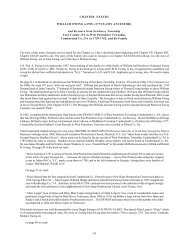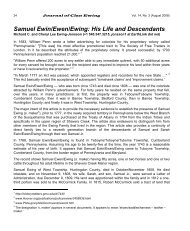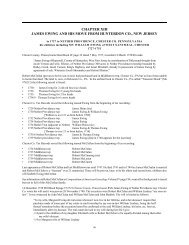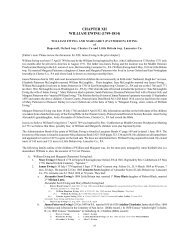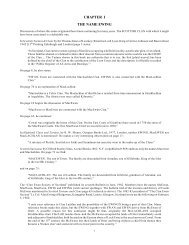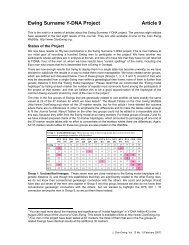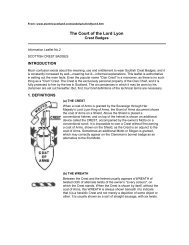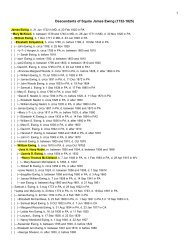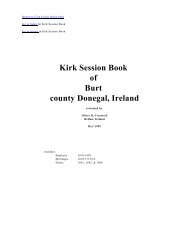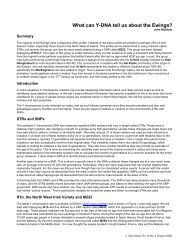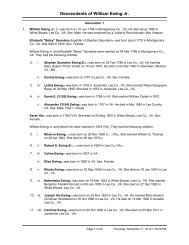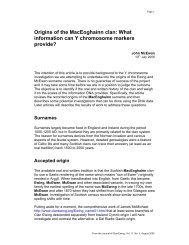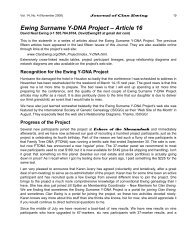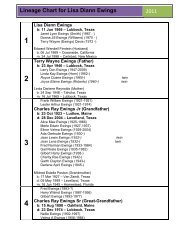Chapter XIV - Ewing Family Association
Chapter XIV - Ewing Family Association
Chapter XIV - Ewing Family Association
You also want an ePaper? Increase the reach of your titles
YUMPU automatically turns print PDFs into web optimized ePapers that Google loves.
each or eoch “a steed,” and is rendered “a knight” or “horseman.” 76 But has the<br />
vocable been correctly divided into its components? Is not eochaidh rather eo<br />
cathaidhe “yew warrior” (O. Ir. cath “battle,” cathidhe “warrior;” cf. also eo-chrann<br />
“yew tree;” 77 and the placename Eochaill, “yew wood,” eo and coill, not eoch<br />
“horse” and all “great?” Another nominative form of the name is Eochu, 78 which<br />
occurs under year 494 in the Annals of Ulster, and under year 882 in the Annals<br />
of the Four Masters, and elsewhere. While Eochu is admittedly a plural form of<br />
each “horse,” surely in this case it is from eo “yew” and cu “warrior” (cf. here<br />
Donchu, “brown-haired warrior,” and Muirchu “sea warrior” or “sea dog”). Both<br />
Eochu and Eochaid have the same genitive form.<br />
Dr. Macbain states that ogmic Ivacattos is equivalent to Eochaid, but iva is<br />
not very suggestive of “horse,” and is much more like various equivalents of<br />
“yew” (cf. D. ijf = OHG. iwa = MHG. iwe = G. eibe = F. if = Sp. iva = O. Fr. iv and<br />
ML. ivus “yew”). Professor Rhys considers evo equivalent to Lat. aevum<br />
“everlasting,” and that Evolengi of ogam inscriptions is compounded of evo and<br />
leng, and signifies “long-lived” or “he of the long life;” but although the common<br />
bestowal of fanciful names is not denied, is it not much more likely to be “long<br />
yew,” i.e. “he of the long bow?” Such an epithet could reasonably be applied to a<br />
person during his lifetime. The cattus of Evacattus, Ebicatus, and other names<br />
appears to be catu or cat, so common in Gaulish and Breton names, and<br />
signifying “battle” (W., Corn., and Bret. cad). Evacattus therefore appears to be<br />
etymologically the same as Eochaid, and to mean, as above stated, “yew<br />
warrior.” It may be noted that, on the contrary, Dr. August Fick considers the Irish<br />
name Eachaidh to be equivalent to Gaulish Epidius (ep, epo “horse”). 79<br />
If, however, eoch is the first syllable, and does signify “a horse,” it is<br />
somewhat extraordinary that the fact is omitted by all dictionarians 80 with the<br />
exception of J. B. Bullet (1754), who gives each, ech, and eoch as equivalents<br />
for horse, his authorities being some ancient unspecified MSS., but without<br />
indicating the cases, and eoch may well be some other form than nominative.<br />
Eoch, according to O'Reilly, signifies “groaning” or “sighing,” otherwise neither<br />
eoch nor eogh is mentioned in any list of the Irish compilers. Even admitting eoch<br />
and not eo to have been the stem of Eochaid, is it not probable that it has the<br />
76 Irish Pedigrees, pp. 36 and 229.<br />
77 In cath catharda (Irische Texte von E. Windisch, 4 (2), line 336, etc.).<br />
78 Nominative forms of Eochaid are sometimes Eochaig, Eocach, etc. (Cf. caidh “chaste”<br />
becoming caig in Munster: O'Reilly.)<br />
79 That there are personal appellatives in which the word horse can be traced is shown by the<br />
numerous Sanskrit names with prefix acva, Greek with ιππ-, ιππο, and Gaulish with ep (e.g. Epopennus<br />
= Each-cenn) ; Namengrup en der indoermanischen Grundsprache in Die griechischen<br />
Personennahmen von August Fick, p. cxciv.<br />
80 1 have referred to forty dictionaries and glossaries. According to O'Reilly, plural forms of each<br />
are eich and eocho, and accusative plural eochu. Yet in numerous Gaelic proverbs and<br />
quotations relating to the horse collected by A. R. Forbes (Gaelic Names, 1905), eoch is never<br />
used, not even in the plural. Forbes, however, mentions ech and eoth (perhaps a misprint), as<br />
well as each (pp. 9, 10), and states that each, ech, eoch, etc., come from the root ah “to hasten.”<br />
In the Scottish Celtic Review, pp. 106 and 198, Professor Windisch, writing on the “Laws of<br />
Auslaut in Irish,” mentions eoch (dative) for prehistoric eq-o Lat. equo, the nominative being ech<br />
(p. 198). Ech is also the form used in the Brehon Law Tracts.



